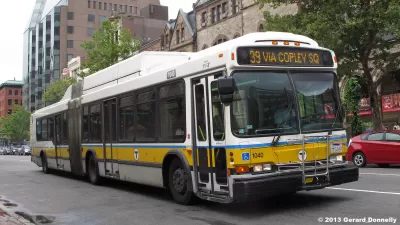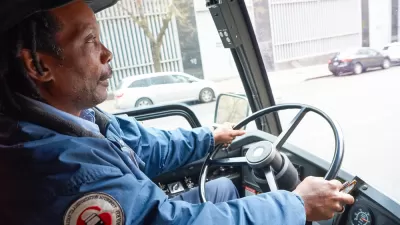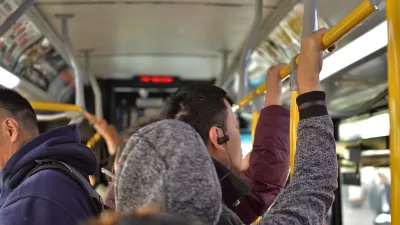Cities around the country are embracing free fares to lure riders back to public transit, but the ridership recovery continues to sputter.

Like other cities, Boston began offering free transit as a way to address historic inequities and boost faltering ridership during the pandemic. But despite the benefits of eliminating transit fares, that policy alone may not do as much to reduce carbon emissions or congestion as some advocates hope, write Lisa Kashinsky and Tanya Snyder in Politico.
Early analysis of Boston’s initial Route 28 bus initiative by both the city and the MBTA showed mixed results: Ridership was up and boarding was quicker during the first four months of the program. Yet only 5 percent of survey respondents said they would have taken a car if not for the free bus trip, undermining the claim that free transit is a climate initiative or a cure for urban congestion.
The authors point out two concerns about free transit programs: “First, while ridership on the free lines usually goes up, generally the boost comes from those who might typically bike or walk, rather than pulling people out of their cars”
“Second, riders — including those with low incomes — consistently say that what really matters to them is whether the bus comes frequently enough to be useful.” Sacrificing service for lower fares doesn’t ultimately serve the people most dependent on transit.
The other major question: long-term funding. Many recent free transit programs were funded by pandemic relief dollars. “When that dries up, it’s unclear where the money will come from to keep these programs rolling.”
FULL STORY: Mayors are wielding free transit to draw people back downtown. It’s not that easy.

Alabama: Trump Terminates Settlements for Black Communities Harmed By Raw Sewage
Trump deemed the landmark civil rights agreement “illegal DEI and environmental justice policy.”

Planetizen Federal Action Tracker
A weekly monitor of how Trump’s orders and actions are impacting planners and planning in America.

Why Should We Subsidize Public Transportation?
Many public transit agencies face financial stress due to rising costs, declining fare revenue, and declining subsidies. Transit advocates must provide a strong business case for increasing public transit funding.

Understanding Road Diets
An explainer from Momentum highlights the advantages of reducing vehicle lanes in favor of more bike, transit, and pedestrian infrastructure.

New California Law Regulates Warehouse Pollution
A new law tightens building and emissions regulations for large distribution warehouses to mitigate air pollution and traffic in surrounding communities.

Phoenix Announces Opening Date for Light Rail Extension
The South Central extension will connect South Phoenix to downtown and other major hubs starting on June 7.
Urban Design for Planners 1: Software Tools
This six-course series explores essential urban design concepts using open source software and equips planners with the tools they need to participate fully in the urban design process.
Planning for Universal Design
Learn the tools for implementing Universal Design in planning regulations.
Caltrans
Smith Gee Studio
Institute for Housing and Urban Development Studies (IHS)
City of Grandview
Harvard GSD Executive Education
Toledo-Lucas County Plan Commissions
Salt Lake City
NYU Wagner Graduate School of Public Service





























